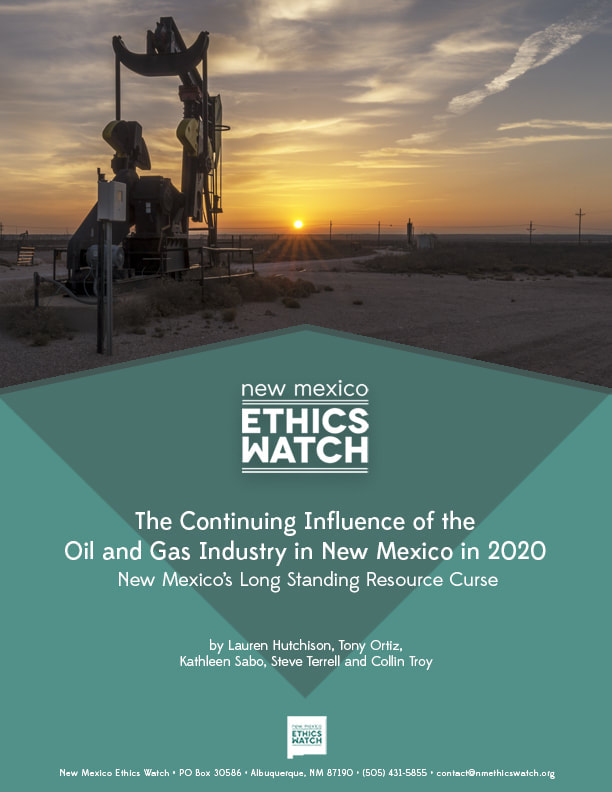This report includes a minor correction as of February 12th, 2021
The year 2020 will forever be synonymous with misery. Besides killing nearly 3,200 people in New Mexico, the COVID-19 pandemic forced the economy to shut down, causing tens of thousands to lose their jobs in this state in 2020. But according to a new report by New Mexico Ethics Watch, money from oil and gas interests to New Mexico politicians and political organizations continued to flow, with almost $3.3 million from the industry going to political causes during this past election cycle.
Using campaign finance data from the New Mexico Secretary of State’s Office and the National Institute on Money in Politics’ FollowtheMoney.org, New Mexico Ethics Watch documented $3,296,839 in direct contributions from the industry to candidates, committees, and PACs in the state during the primary and general elections last year. This amount is eye-popping in a small, low-income state like New Mexico, where the average annual income, according to the U.S. Census Bureau, is just over $26,000. However, the totals would increase dramatically if lobbyist compensation were included. New Mexico does not require this disclosure, unlike many other states.
“Though the pandemic left many New Mexicans struggling to make ends meet, oil-friendly politicians didn’t have to worry about their campaign coffers going dry,” said Kathleen Sabo, executive director of New Mexico Ethics Watch. “Hopefully this report will encourage journalists, academic researchers and the general public to better scrutinize the political activities of this major industry. And we hope policy makers will take action to improve transparency and accountability in the area of campaign finance.”
Sabo co-authored the report with New Mexico Ethics Watch’s Lauren Hutchison, Tony Ortiz, Steve Terrell and Collin Troy.
Using campaign finance data from the New Mexico Secretary of State’s Office and the National Institute on Money in Politics’ FollowtheMoney.org, New Mexico Ethics Watch documented $3,296,839 in direct contributions from the industry to candidates, committees, and PACs in the state during the primary and general elections last year. This amount is eye-popping in a small, low-income state like New Mexico, where the average annual income, according to the U.S. Census Bureau, is just over $26,000. However, the totals would increase dramatically if lobbyist compensation were included. New Mexico does not require this disclosure, unlike many other states.
“Though the pandemic left many New Mexicans struggling to make ends meet, oil-friendly politicians didn’t have to worry about their campaign coffers going dry,” said Kathleen Sabo, executive director of New Mexico Ethics Watch. “Hopefully this report will encourage journalists, academic researchers and the general public to better scrutinize the political activities of this major industry. And we hope policy makers will take action to improve transparency and accountability in the area of campaign finance.”
Sabo co-authored the report with New Mexico Ethics Watch’s Lauren Hutchison, Tony Ortiz, Steve Terrell and Collin Troy.
| |||||||||||||||



